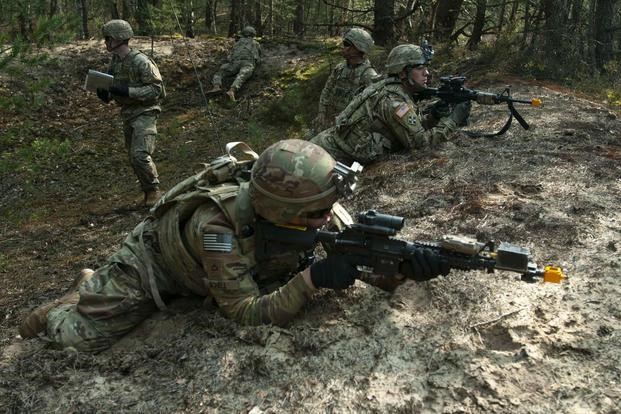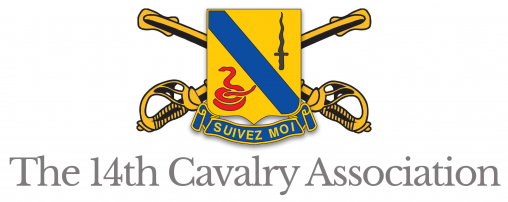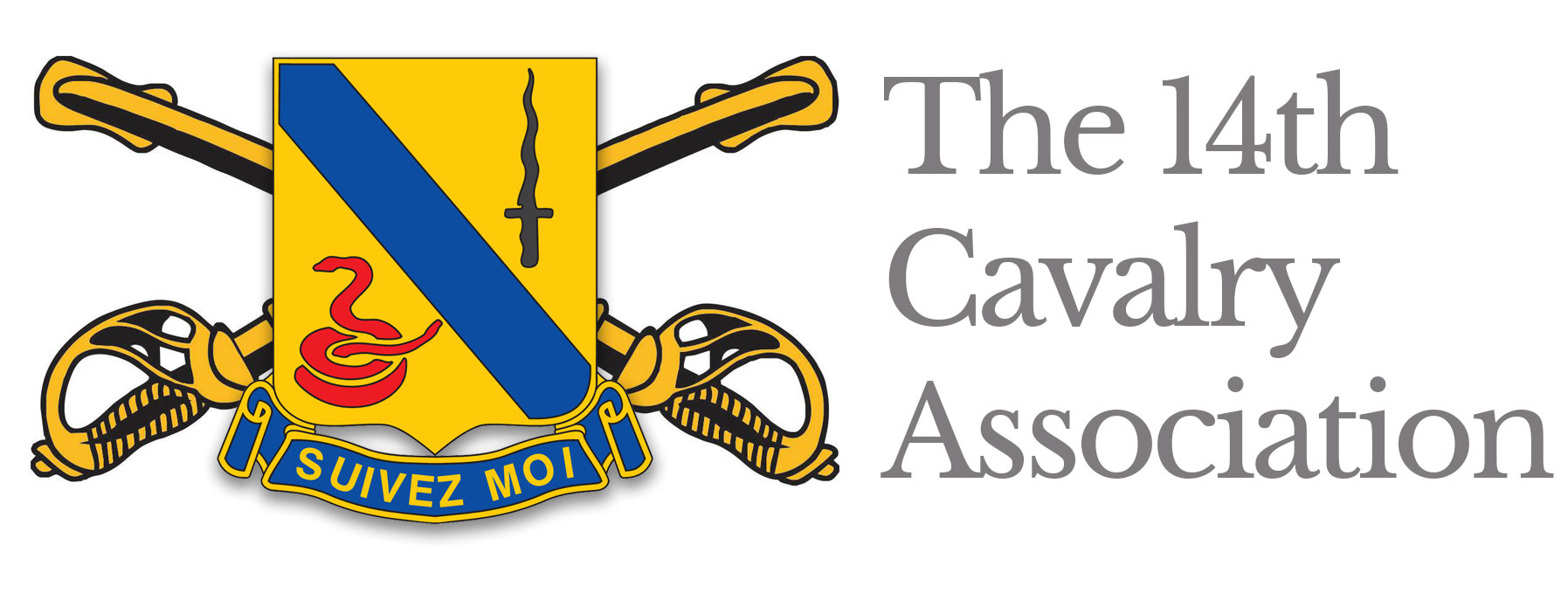A New Shave-Tail Joins the 14th Cavalry Regiment
In early May 1958 two 2nd Lieutenants stepped off the morning train from Frankfurt at the Fulda Bahnhof and began their first active duty assignment with the 1st Squadron, 14th Armored Cavalry Regiment. Rob Roller was a bachelor, and I was newly married, but after an all-too-short honeymoon, I left Gloria to finish her last semester at the University of Kentucky while I shipped out.
We were met that Sunday by Captain Tillet, the Headquarters Company Commander and taken to Downs Barracks. Lieutenant Colonel Dye, the battalion commander, welcomed us and assigned us to companies, Rob to A Company, and me to C Company. (Two years later cavalry units were redesignated as squadrons and troops, instead of battalions and companies.) I soon discovered C Company was in the field about twenty miles away training for its company test. So, I went to the supply room and was issued field gear, and departed shortly afterward in a supply vehicle for the Wildflecken training area.
Arriving in the Wildflecken cantonment, I was deposited in front of a stone barracks, formerly home to a German Wehrmacht unit and now the temporary headquarters of C Company. I strode into the orderly room, stopped two paces in front of a sandy-headed first lieutenant who was sipping coffee and reading the Stars and Stripes newspaper with his feet propped up on the desk. I snapped a sharp salute, and in my best command voice boomed, “Sir, Lieutenant Pocock reporting for duty, as ordered.” John Schick almost fell out of his chair, spilled coffee, and managed to return my salute while suppressing a laugh at my parade-ground manner in a field environment.
A little later I met Captain Cromwell and was assigned to 1st Platoon that was temporarily under the command of Master Sergeant (MSgt) Jesus Santiago and preparing for its upcoming platoon test in the field. Although initially told to simply observe the platoon as MSgt Santiago led it through its paces, Captain Cromwell decided to put me in command of the platoon for the two-day test.
As I spent a cold night waiting for our first movement to contact, I got little sleep reading the test requirements, and getting to know other members of the platoon. MSgt Santiago who, as platoon sergeant, would now command our section of two M48 tanks, was an experienced tanker and Korean War veteran, as were the other sergeants: Sergeant First Class (SFC) Smith, the infantry squad leader, SFC Schulz, the scout squad leader, and SFC Cunningham, the mortar squad leader. There were a few other Korean War veterans, but most of the privates were eighteen-year old recent enlistees or draftees.

The test went by in a blur of radio messages, reporting enemy activity, deploying the platoon, performing zone and route reconnaissance, resupplying, and conducting delay actions against aggressor forces. Besides being new and inexperienced I had an additional problem–locating where I was on the map. Most of the platoon had been to Wildflecken often and knew the limited terrain like the back of their hands; but I didn’t.
Moreover, our maps inaccurately included names of villages and roads in the training area that no longer existed. I was one confused second lieutenant, resorting to a compass and the stars at night, just to be sure I knew which direction was north. Fortunately, my driver, PFC Suggs, was able to set me straight on more than one occasion when the company commander was screaming for a report, and I wasn’t sure where I was. Somehow the platoon performed satisfactorily, and I survived my first baptism of command.
Because the 14th Armored Cavalry Regiment was likely to be the first major western force to face a possible Soviet attack, it received new M48 tanks with a heavier 90mm gun in 1958 to replace all M41 light tanks. Even though Wildflecken was a comparatively small training site, the regiment established a live fire tank range there for our tankers to maintain their tank gunnery proficiency. That lasted one or two years until one of our tank crews fired a 90mm round that went over a hill that was the backstop of the gunnery range and landed in a German town outside the training area. Fortunately no one was injured, and I was happy that I wasn’t the safety officer or involved in the range firing that day.
Gloria arrived in August while our Squadron was again in the field, but I was able to get a day off to pick her up at the Frankfurt Airport. We spent the night in Frankfurt and I drove her to Fulda the next morning and dropped her off at Ellen Schick’s apartment while I returned to the field exercise for another week. Ellen was the wife of a fellow platoon leader in C Troop, John Schick, and the daughter of an Army Colonel so she was very familiar with Army culture, customs, and slang. Although Gloria had sung at Fort Knox enlisted clubs with a small Louisville entertainment group, she had been closely chaperoned and didn’t know much about Army Life. The week with Ellen was often confusing, but very enlightening for Gloria.
As a second lieutenant my salary was $220 a month and we received a small housing allowance until a fully furnished government apartment was available. The best housing I could find in the city of Fulda was a one bedroom furnished apartment on the second floor of a building where grave stones were made for use in the cemetery across the street. At least it was a quiet place to sleep at nights.
Our annual troop and squadron training exercises required more terrain than Wildflecken provided, and they were conducted in the summer in the countryside near Fulda. Moving sixty ton tanks and other heavy vehicles through villages with narrow streets and other weak roads and bridges caused damage to German property that was categorized as Maneuver Damage in U.S. Army Europe budget. As part of the claim process for village officials and German property owners, the claim had to be investigated and verified by an American officer.
About a month after the squadron training exercise ended I was given the task of checking some Maneuver Damage outside the village of Oberbimbach. A description of the damage and the map coordinates were provided, and I don’t believe that German language proficiency was mandatory for the assignment. Yet having three years of college level German made it much easier for me to locate the damage site and speak with the German claimants. But when Specialist Suggs drove our jeep into Oberbimbach about 1400 hours no one was in sight.
I knocked on a door and asked where I could find the Burgermeister (chief official) and was told that he was at the Bierstube. As I entered the dimly lit beer hall I saw about twenty five middle aged German men sitting at tables with steins of beer in front of them. Many of them had been in the German Army during World War II, and at the sight of my uniform there was a suspicious silence. But after I found the Burgermeister and explained that I was there to verify his claim for payment from the U.S. Army, I became very popular and had difficulty refusing many drink offers that came my way.
January 13, 1959 my platoon was assigned border patrol duty along the Interzonal Border that separated East and West Germany. The platoon established several observation posts (OPs) usually manned by an infantry or scout squad with all their weapons and live ammunition. My responsibility was to stay in radio contact with the platoon and to inspect their positions at least once in daylight and once in darkness. That day my task was especially difficult because of a winter storm that left about two feet of snow on narrow roads at the higher elevations. Specialist Suggs struggled to plow our jeep through the deep snow, and I am not sure now that I made it to every OP that night. We were expecting our first child any day, and that began happening the next evening. I called Dr. Kotch who lived in an apartment nearby and he directed us to come to his apartment while he arranged for an ambulance to take Gloria to the 97th General Hospital in Frankfurt, about 60 miles southwest of Fulda. The 97th General was better equipped than the German hospital in Fulda, especially if an incubator was needed. After he examined Gloria she was bundled into the “cracker box” ambulance, and it set off over the snow packed highway while I followed in our car. After a few miles the ambulance pulled to the side of the road and stopped. I slid to a stop behind the ambulance and rushed up thinking Gloria was having the baby only to learn that the driver needed to fix one of the chains he had put on the tires for better traction.
That happened once or twice more, but we finally reached the hospital in time and a few hours later our son, James Bryant Pocock, became eligible to receive a Sterling silver baby cup from the officers of the 1st Squadron. We made another trip to the 97th General Hospital, but in much better weather, in August 1960 and added another baby cup to our collection with the birth of our second son, John Weldon Pocock.
James A. Pocock
Second Lieutenant in 1958 (the year the above happened)
1st Squadron, 14th Armored Cavalry Regiment
Served in C Company (Platoon Leader), Headquarters Co
(Support Platoon Leader) and D Troop (Executive Officer)
May, 1958 to May, 1961
Retired, Nov. 1994, as a Major General, U.S. Army Reserve

